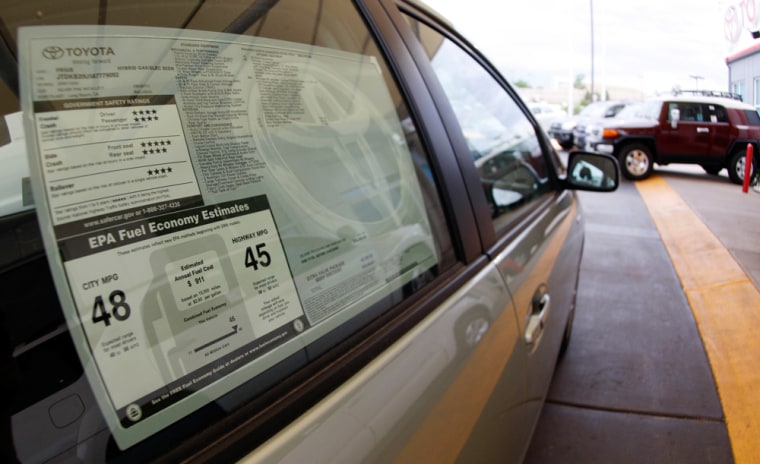Toyota Motor Corp. could overtake General Motors Corp. in monthly U.S. sales for the first time in June, but the victory could be a hollow one as the weak economy continues to pummel the auto industry and even Toyota struggles to meet U.S. consumers' sudden and insatiable demand for hybrid cars.
Analysts are predicting another double-digit dip in June sales, in large part because buyers are shunning big vehicles. Automakers report sales figures Tuesday.
J.D. Power and Associates, a marketing and consulting company, predicts the annualized sales rate for June — which shows what sales would be if they continued at the same rate for a full year — could be 12.5 million vehicles. If so, that would be the lowest monthly rate since 1992.
Jesse Toprak, chief industry analyst for the auto information site Edmunds.com, predicts sales will be down 13 percent in June to 1.26 million, or an annualized rate of 14.9 million. Toprak said GM could see an uptick in the last few weeks because of a zero-percent financing deal that began Tuesday, but it won't be enough to stem the automaker's losses in trucks and sport utility vehicles.
"Consumers are either postponing their purchases or buying smaller, more fuel efficient vehicles to a degree we have not seen before," Toprak said.
Falling home values, weak consumer confidence and high gas prices have taken their toll on auto sales, which had seen seven consecutive months of declines as of May. That's the longest period of consecutive monthly declines in eight years, according to Edmunds.com.
When customers do buy, they're picking smaller cars, crossovers and hybrids. The demand for more fuel efficient vehicles has been a boon to Japanese automakers like Toyota and Honda Motor Co., which rely less heavily on trucks and sport utility vehicles than the Detroit Three, while Ford Motor Co. and GM are having a hard time keeping up with consumer interest in hybrids.
In May, Toyota sold just 9,340 vehicles less than GM and grabbed 18.4 percent of the U.S. market share compared to GM's 19.1 percent. As recently as 2005, GM controlled 26 percent of the U.S. market to Toyota's 13 percent.
Still, Toyota, which saw sales drop 4 percent in May, is having its share of problems. The automaker has been unable to ramp up production of its Prius and Camry hybrids to meet demand. Prius sales fell 38 percent in May, and Toprak said Toyota probably could have sold double the number of Priuses it sold that month if it had adequate supply.
Toyota spokesman John Hanson said the company set its production schedule well before the current run-up in gas prices and can't increase production because it doesn't have enough plant capacity or batteries and other specialized components.
"No one saw this coming, as far as the huge leap in oil prices and the rapid response by consumers to move into smaller cars," Hanson said. "We simply haven't been able to keep up with our product plan."
Toyota makes 250,000 Prius hybrids per year, of which 60 percent to 70 percent are allocated to the United States. Hanson said Toyota has considered building a new U.S. plant to make the Prius and other hybrids but has made no decision on that. The Camry hybrid is produced at Toyota's plant in Georgetown, Ky., but many of its parts are shipped from Japan.
John McEleney, who owns a Toyota dealership in Clinton, Iowa, said he expects to be sold out of Priuses until at least November. In the first two quarters of this year, he had a 60- to 90-day waiting list for the Prius, but in May that jumped to a six-month wait. He also has a 60- to 90-day wait for the Camry hybrid.
McEleney said there are other small cars with good fuel economy, such as the Toyota Yaris subcompact, but that's also in short supply and he can't always talk buyers into another model.
"People who want a hybrid are tough to move off of that, and the environmentally favorable aspect of it," he said. "As a rule, people have either decided to get on the waiting list or just postponed the sale."
Other automakers also have had trouble meeting demand for hybrids.
Ford spokeswoman Jennifer Moore said Ford set production at 25,000 for the Ford Escape and Mercury Mariner hybrids this year and won't be changing that despite high demand. Escape sales were growing year-over-year through March but saw a double-digit decline in May.
Moore said Ford expects to make up some ground when it begins offering hybrid versions of the Ford Fusion and Mercury Milan sedans later this year.
GM also had to delay the launch of its 2008 Saturn Aura, Saturn Vue and Chevrolet Malibu hybrids because of a battery problem. A recall of 9,000 2007 Saturn Aura and Vue hybrids which began in February is still under way, and batteries for those vehicles had to be replaced before more were made available for the new hybrids, spokesman Tom Wilkinson said.
